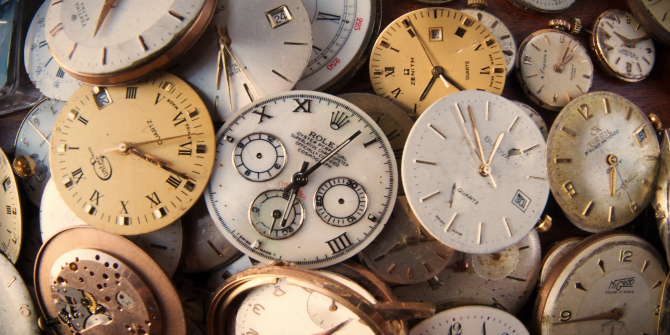 Ahead of the closing session for Law on Trial 2014, Renata Salecl reflects on the role and authority of expertise in the justice system. She argues which experts we rely on very much depends on today’s media and the comforting fantasies they offer supporting the efficacy of science and of its empirical neutrality. But error and fraud also play a significant role and it cannot be ignored that such technologies are frequently compromised by their implementation, by subjective motives driving their design and application, and by the very strength of the expectations and fantasies they attract.
Ahead of the closing session for Law on Trial 2014, Renata Salecl reflects on the role and authority of expertise in the justice system. She argues which experts we rely on very much depends on today’s media and the comforting fantasies they offer supporting the efficacy of science and of its empirical neutrality. But error and fraud also play a significant role and it cannot be ignored that such technologies are frequently compromised by their implementation, by subjective motives driving their design and application, and by the very strength of the expectations and fantasies they attract.
Experts are the new authorities in today’s society. Law and policy makers rely on their knowledge when difficult decisions are made. What happens when experts openly admit that they do not know? What can be done when they knowingly give fraudulent testimony? How do policy makers choose which experts to call upon? How does the judiciary system handle experts, how are they prepared for giving testimony and what kind of battles might they engage in when presented with different expertise? Who wins in the war of experts?
These questions easily come into our minds when we realize that almost all domains of our lives are dominated by experts. However, we also know that expert opinion constantly changes and that we go from one type of experts to another. In the domain of law, for example, the new vogue is to employ experts from the domain of neuroscience and genetics while quite recently the masters who were in charge of explaining the behavior of the person on trial were psychiatrists.
Which experts we rely on in the domain of law very much depends on today’s media. If in the past, detective novels and courtroom dramas placed their emphases on psychological factors of motive, cunning, and emotional consequence, the emergence of reality TV has seen a passion to focus on the physical details of actual crimes and demonstrate how, with the help of advancements in forensic science, even the most skilled criminals may be found. On the US television station American Court TV (which is now named truTV), the most high-tech crime investigations are presented in the immensely popular show Forensic Files. This show usually presents complicated crime cases in which there was a great chance that the perpetrator would never be found. But with the help of highly developed forensic science, the offender is invariably brought to trial even many years after the crime was committed. (On its website, Forensic Files is advertised with the following: “We resolve to give you more of the stories you love: unlikely perpetrators, crazy plot twists, forensic breakthroughs, and—of course—investigators who always get their man (or woman)!”)
 Image credit: W. S. Gilbert (Wikimedia, public domain)
Image credit: W. S. Gilbert (Wikimedia, public domain)
The clear message behind such shows is that “the law will always find you”—it is only a matter of furthering forensic science and the law will catch the most skilled criminal. The results of DNA and other forms of forensic evidence support an understandable and comforting fantasy of the efficacy of science, of its empirical neutrality, and thus, by extension, its fundamental justness. Yet we cannot escape the simultaneous fact that such technologies are frequently compromised by their implementation, by subjective motives driving their design and application, by the very strength of the expectations and fantasies they attract—which will naturally be given to exaggerate and simplify, romanticize and compress—and by the private issues investigators, technicians, and experts may bring to bear on the evidence they yield. (Even as early as 1982, Ian Hacking warned that “the fetishistic collection of overt statistical data about populations has as its motto ‘information and control,’ but it would more truly be ‘disinformation and mismanagement’.”)
Sadly, we are more and more also encountering examples of forensic fraud. There are a number of possible explanations for this. The term usually used to describe it is “bad science.” This implies that we are dealing with a technical problem—either we have a good machine or a bad, faulty one. The failure thus lies with the machine itself. If we repair or improve the machine and remove the fault, everything will be fine. The term “bad science” does not necessarily invoke a human factor—that is, a bad scientist. It rather resorts to an impersonal description of the problem.
“Bad science” can also be understood as “sloppy science.” Here we have more recognition of the human element since the expression admits that the technician doing the work might have been careless and so made a mistake. He might have also been overworked, not properly trained, etc. Yet such explanations of a human failure again confine the problem to something that can be easily amended. The perception of the technician is similar to that of the machine—if we perfect him, the results will be better next time.
But what about the intricate psychic mechanisms that might be at work when a forensic scientist gives fraudulent testimony in court? The most common explanation for forensic fraud is that there often exists a special link between the prosecutor and the forensic scientist by which the expert very much wants to please the prosecutor. Part of the expert’s strategy here involves guessing the desire of the authority and gratifying it. In some cases this might be a desire to uphold the prosecutor’s personal authority, but behind this might very well be the desire to uphold the authority the prosecutor is taken to symbolize. An example might be a policeman who wants to show that he did his job diligently, a senior officer renowned for getting results, or a doctor who prides himself on the accuracy of his observations. The desire for efficiency and the resulting sense of power play an important role. However, there are also cases where an expert gets an almost perverse enjoyment from showing the mastery of his expertise and is thus quite negligent over the question if he or she is condemning a right person or not.
Since there are so many questions related to the power of experts, one needs to keep doubt alive even if the authority of the expert in vogue seems unquestionable and all-powerful.
More on these questions at the event Law on Trial: Friday 20 June 2014. The Power of Experts Chair: Dr. Marinos Diamantides, Reader, School of Law, Birkbeck College Participants: Dr. Matjaž Ambrož, Senior Lecturer, Faculty of Law, University of Ljubljana Dr. Amanda Dickins, Deputy Chief Scientific Advisor, Dept. for Business Innovation and Skills Dr. Mary Malecka, Barrister, Garden Court Chambers and Bond Solon Legal Training Company Prof. Renata Salecl, Professor of Psychology and Law, School of Law, Birkbeck College Room B34, Malet Street, Birkbeck, London WC1E 7HX Starts at 6.30pm. Free drinks reception to close Law on Trial 2014, after this final panel.
Note: This article gives the views of the authors, and not the position of the Impact of Social Science blog, nor of the London School of Economics. Please review our Comments Policy if you have any concerns on posting a comment below.
Renata Salecl is Professor of Psychology/Psychoanalyis and Law in the School of Law. A senior researcher in criminology at the Faculty of Law in Ljubljana, Slovenia and a leading scholar on the subject of psychoanalysis and law, she has a long association with the critical legal studies movement. She was previously Centennial Professor at the department of law at the London School of Economics.







